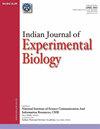柿叶提取物对大鼠睾丸缺血-再灌注模型氧化损伤和炎症的保护作用
IF 0.7
4区 生物学
Q4 BIOLOGY
引用次数: 0
摘要
在睾丸缺血-再灌注模型中,研究红枣叶提取物对氧化损伤和炎症的保护作用。32只雄性大鼠随机平均分为4组。对照组和缺血/再灌注(I/R)组给予生理盐水(SF)治疗5 d, DK组和I/R+DK组给予200 mg/kg的DK叶提取物。对照组和DK组行左睾丸切除术,I/R组和I/R+DK组行扭转睾丸2小时。所有大鼠在手术后24小时处死并收集样本。与对照组相比,I/R组MDA水平高,GSH和GSH- px水平低;与I/R相比,I/R+DK的MDA水平较低,GSH和GSH- px水平较高。I/R组存在充血和出血,I/R+DK组精管结构恶化和精子发生较少。TNF-α、COX-2、BCL-2、BAX基因在I/R+DK中的表达显著降低。TNF-α和COX-2蛋白在I/R和I/R+DK中较高,NRF2在I/R+DK中较高。上述结果表明,DK叶提取物对I/R模型大鼠的氧化损伤和炎症具有重要的保护作用。本文章由计算机程序翻译,如有差异,请以英文原文为准。
Protective Effects of Diospyros Kaki Leaves Extract against Oxidative Damage and Inflammation in the Testicular Ischemia-Reperfusion Model in Rats
Protective effect of Diospyros Kaki leaves extract against oxidative damage and inflammation in the testicular ischemia-reperfusion model were investigated in the study. 32 male rats were randomly and equally divided into 4 groups. While saline (SF) was given to the control and ischemia/reperfusion (I/R) groups for 5 days, Diospyros Kaki (DK) and I/R+DK were given 200 mg/kg of DK leaf extract. Afterwards, left orchiectomy was performed in control and DK, and testicular torsion was performed in I/R and I/R+DK for 2 hours. All rats were sacrificed 24 hours after procedures and samples were collected. Compared to the control, I/R had high MDA levels, low GSH and GSH-Px levels; compared to the I/R, MDA levels of the I/R+DK were lower, and the GSH and GSH-Px levels were higher. In I/R, the presence of congestion and hemorrhage were determined and the deterioration in seminiferous tubule structure and spermatogenesis were less in the I/R+DK. TNF-α, COX-2, BCL-2, and BAX genes expressions significantly lower in the I/R+DK. TNF-α and COX-2 proteins were higher in I/R and I/R+DK, while NRF2 was higher in I/R+DK. These results show DK leaves extract has crucial protective effect against oxidative damage and inflammation in the I/R model of rats.
求助全文
通过发布文献求助,成功后即可免费获取论文全文。
去求助
来源期刊
CiteScore
1.57
自引率
33.30%
发文量
84
审稿时长
6 months
期刊介绍:
This journal, started in 1963, publishes full papers, notes and reviews in cell biology, molecular biology, genetic engineering, endocrinology, reproductive biology, immunology, developmental biology, comparative physiology, radiation biology, chronobiology, microbiology, pharmacology, toxicology and other biological fields including instrumentation and methodology. The papers having experimental design involving alteration and/or manipulation in biological system(s) providing insight into their functioning are considered for publication. Studies involving higher animals, human beings and of clinical nature are not encouraged for publication in the journal.

 求助内容:
求助内容: 应助结果提醒方式:
应助结果提醒方式:


